YOU CAN ORDER ANY OF THESE BY USING THE LINK BELOW, AT THE END OF THESE REVIEWS. WE ARE GRATEFUL FOR YOUR READING OUR NEWSLETTER AND ESPECIALLY GRATEFUL FOR ANY ORDERS YOU SEND OUR WAY. AS YOU MAY SURMISE, IT ISN’T EASY MAKING A LIVING TRYING TO PROMOTE THESE KINDS OF RARE RESOURCES. WE APPRECIATE YOUR SUPPORT.
WE SHOW THE REGULAR RETAIL PRICE BUT WILL TAKE A COMPLIMENTARY 10% DISCOUNT OFF ANY THAT YOU ORDER.
Early in Evicted, Desmond Matthew’s extraordinarily well reported study of poverty, housing, profits, and evictions, there is a bit of a history lesson: in 1967, 200 African Americans and others marched for fairer housing opportunities across an iconic bridge dividing the predominantly black part of Milwaukee and the white section of the Wisconsin city. Considered one of 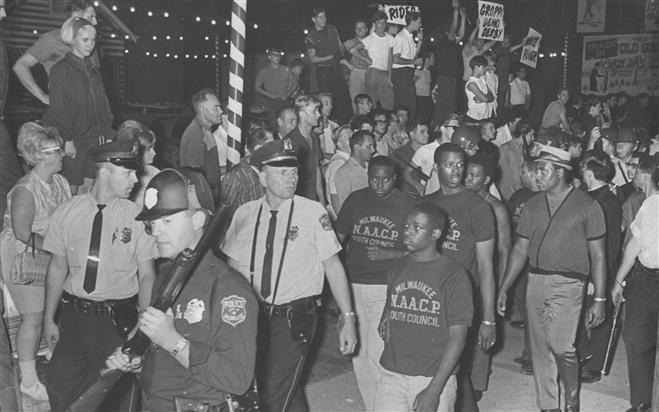 the most racially segregated cities in America, more than 10,000 whites pushed them back in a scene perhaps reminiscent of the bloody day at the famous Edmund Pettus Bridge in Selma a few years earlier. For 200 more days the dedicated black and white marchers protested, pushing on to symbolically insist on fair treatment and desegregation. For 200 more days they were abused, pushed back, shot at with sniper fire, their NAACP headquarters burned, their clergy leaders arrested. Two hundred persistent days in a row!
the most racially segregated cities in America, more than 10,000 whites pushed them back in a scene perhaps reminiscent of the bloody day at the famous Edmund Pettus Bridge in Selma a few years earlier. For 200 more days the dedicated black and white marchers protested, pushing on to symbolically insist on fair treatment and desegregation. For 200 more days they were abused, pushed back, shot at with sniper fire, their NAACP headquarters burned, their clergy leaders arrested. Two hundred persistent days in a row!
A lot was happening in 1967, I know; I was just becoming interested in the world beyond my football practice, The Monkees, and church youth group. I had a Great Aunt Lilly in Milwaukee, of German descent, and we visited her about that time, maybe ’68. To not have heard about this amazing story of protest, racism, and the struggle for desegregation and justice is itself amazing, is it not?
Have you heard of this epic slice of the civil rights story?
Well, in the last few years there has been renewed uprisings, protests, slogans – Black Lives Matter! Hands Up Don’t Shoot! — and there has been, for a variety of reasons, push-back. I don’t think many would argue that the election of our new President came about in part due to some considerable anxiety about where the protests against palpable injustice and debates about racial profiling, mass incarceration, anti-immigration sentiments, multi-culturalism and so forth. We can all be glad there are not tens of thousands of whites beating down peaceful civil rights marchers like in Selma or Milwaukee, but we also must admit that there’s a tension in the air that has arisen in recent years. Legitimate grievances about racism, often institutionalized and ubiquitous white privilege and some legitimate concerns about tactics and ideologies of the progressive protests have created a new face to the culture wars.
Here are some mostly brand new books that address issues of race that we think are very important. A few are on my bed-stand now, a few are in my living room stacks. It’s good to have such wealth of new resources. I hope you agree that we need to be reading and talking about these kinds of books and we should support those publishers who continue to resource us with these kinds of tools that can “grant us wisdom” for, as the old hymn puts it, “the living of these days.”
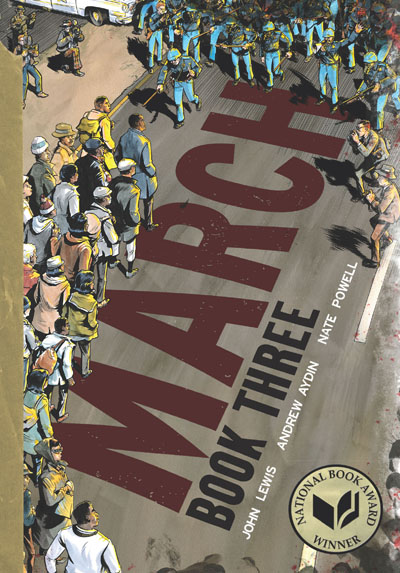 March Book Three John Lewis, Andrew Aydin, Nate Powell (Top Shelf Productions) $19.99 This third and final installment of the award-wining graphic novel trilogy was released late last year and has garnered award after prestigious award.
March Book Three John Lewis, Andrew Aydin, Nate Powell (Top Shelf Productions) $19.99 This third and final installment of the award-wining graphic novel trilogy was released late last year and has garnered award after prestigious award.
As Raina Telgemeir writes boldly on the back cover:
March is one of the most important graphic novels ever created – an extraordinary presentation of an extraordinary life, and proof that young people can change the world. I’m stunned by the power of these comics, and grateful that Congressman Lewis’s story will enlighten and inspire future generations of readers and leaders.
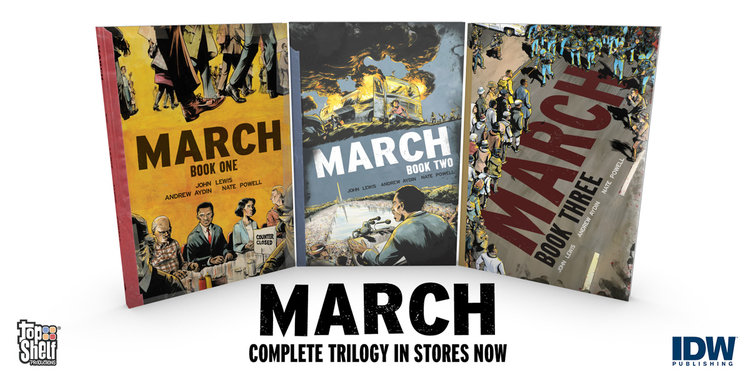 Although the first two volumes, March Book One and March Book Two, are fabulous and must-read history books, this final one is searing, picking up the story of Lewis’s leadership of SNCC (the Student Nonviolent Coordinating Committee) and their direct action campaigns such as Freedom Vote and the famous Mississippi Freedom Summer, and the intense debates on the floor of the Democratic National Convention. Lewis was 25 years and and he was preparing spiritually to risk everything at that historic showdown in Selma.
Although the first two volumes, March Book One and March Book Two, are fabulous and must-read history books, this final one is searing, picking up the story of Lewis’s leadership of SNCC (the Student Nonviolent Coordinating Committee) and their direct action campaigns such as Freedom Vote and the famous Mississippi Freedom Summer, and the intense debates on the floor of the Democratic National Convention. Lewis was 25 years and and he was preparing spiritually to risk everything at that historic showdown in Selma.
It crossed my mind to say that we should buy John Lewis’s book as a handbook for a new generation of activists. I hope modern protestors (and those who have opinions about them) learn about the deep nonviolent philosophy of SNCC. But I also hope all of us read it to be reminded, and to be inspired by this kind of bravery, this kind of leadership, this story of some of the most remarkable times in US history.
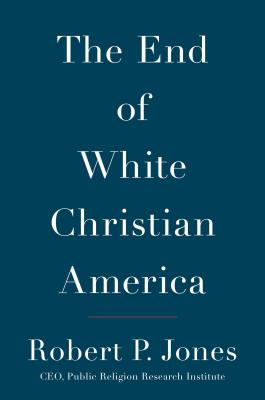 The End of White Christian America Robert P. Jones (Simon & Schuster) $28.00 This powerful and significant book is not brand new but it was released in the late summer of the 2016. It is a major work, provocative and fascinating, “clarifying and useful” as one white pastor noted. It has been called “brilliant” and “eloquent” and the author himself has been called “intelligent and fair-minded.” I cannot give a full accounting of it but I can assure you it is one of the important books to help us put into context much of the anxiety and fear pervasive in our culture these days. It is an argument many have alluded to — I’ve heard Walter Brueggemann and Leonard Sweet and Tom Sine and Marva Dawn give their variations of this general critique decades ago. There is simply no doubt that a certain sort of hegemony has eroded in the last generation or so and there is also no doubt that it has caused resentment in some quarters and anxiety nearly everywhere. (It is to this anxiety that David Gushee addressed his helpful, recent book, A Letter to My Anxious Christian Friends, suggesting that for people of faith it isn’t so bad since we have Biblical and spiritual resources to cope, and it is to this situation that Rod Dreher offers his important, dire proposal in the soon-to-be-released The Benedict Option: A Strategy for Christians in a Post-Christian Nation. PRE-ORDER that from us if you’d like; we’ll have it March 14, 2017.)
The End of White Christian America Robert P. Jones (Simon & Schuster) $28.00 This powerful and significant book is not brand new but it was released in the late summer of the 2016. It is a major work, provocative and fascinating, “clarifying and useful” as one white pastor noted. It has been called “brilliant” and “eloquent” and the author himself has been called “intelligent and fair-minded.” I cannot give a full accounting of it but I can assure you it is one of the important books to help us put into context much of the anxiety and fear pervasive in our culture these days. It is an argument many have alluded to — I’ve heard Walter Brueggemann and Leonard Sweet and Tom Sine and Marva Dawn give their variations of this general critique decades ago. There is simply no doubt that a certain sort of hegemony has eroded in the last generation or so and there is also no doubt that it has caused resentment in some quarters and anxiety nearly everywhere. (It is to this anxiety that David Gushee addressed his helpful, recent book, A Letter to My Anxious Christian Friends, suggesting that for people of faith it isn’t so bad since we have Biblical and spiritual resources to cope, and it is to this situation that Rod Dreher offers his important, dire proposal in the soon-to-be-released The Benedict Option: A Strategy for Christians in a Post-Christian Nation. PRE-ORDER that from us if you’d like; we’ll have it March 14, 2017.)
Yet, as new demographics and new values and new cultural habits and assumptions rise to the fore, there is fresh energy and new hope in some quarters as well. To say we live in changing times – also around issues of race and faith and gender – is to put it mildly. As with any epochal change, there are those who are worried, some who have legitimate concerns about plunging into new ways, and a lot who are willing and able to face the future with resilience and hope.
“America is no longer a majority white Christian nation. In fact, the year 1993 was the last in which white Protestants constituted a majority of the population.” In The End of White Christian America, Robert P. Jones (CEO of the Public Religion Research Institute) explains, “how this seismic change has profoundly altered the politics and social values of the United States.”
In fact, a reviewer in The New York Times said it was, “Quite possibly the most illuminating text for this election year.”
Consider these rave reviews:
As a white pastor who has been active addressing cultural issues for decades, I found this book fascinating, clarifying, and useful. For white Christians who want to serve our nation as a part of our faith, the big story line is not the loss of our centrality in the realms of political power; it’s the welcome opportunities for new partnerships based on shared moral principles. This book also leaves us pondering ways to be part of the sequel. –Rev. Dr. Joel C. Hunter, Senior Pastor, Northland, A Church Distributed
The 2016 election campaign revealed to all and sundry that we live in a new country. Robert Jones has written the best guide I have seen to the America taking shape around us. –Alan Wolfe, Professor of Political Science and Director of The Boisi Center for Religion and American Public Life, Boston College
Robert Jones convincingly illumines the waning influence of white Protestantism in America as well as the reactions of those bewildered or angered by this inexorable shift. Fast-paced and keenly discerning, this book does a remarkable job of explaining why our culture and politics are so fraught and why we seem to be entering a whole new era in our history. Truly a must-read for understanding the divided state of our nation today. –R. Marie Griffith, Director, John C. Danforth Center on Politics and Religion, and John C. Danforth Distinguished Professor in the Humanities, Washington University
Jones persuasively articulates how both the fear and the hope of the new America are animating our faith and our politics. I strongly recommend this book to anyone who seeks to understand how we got to where we are in our churches and politics today, and how we might help build the bridge to a new America. –Jim Wallis, author of America s Original Sin: Racism, White Privilege, and the Bridge to a New America
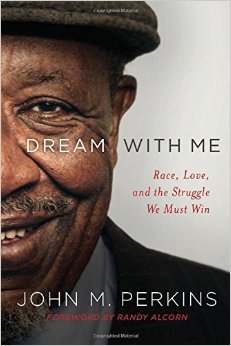 Dream With Me: Race, Love, and the Struggle We Must Win John M. Perkins (Baker Books) $19.99 There is hardly anyone I esteem more within the broader evangelical Christian community that John Perkins. When I was doing my own little book, a collection of inspirational speeches turned into essays for young adults, I said quite simply that I had to have a chapter by John Perkins. I had a number of pretty famous contributors but John’s role was a deal-breaker for me. Graciously he and his staff gave us a tape to transcribe and we happily put it in Serious Dreams: Bold Ideas for the Rest of Your Life. I say this to assure you that I’m not blowing smoke here: you should read Dr. Perkins’s books and this brand new one looks tremendous. It came two days ago so is brand, brand new.
Dream With Me: Race, Love, and the Struggle We Must Win John M. Perkins (Baker Books) $19.99 There is hardly anyone I esteem more within the broader evangelical Christian community that John Perkins. When I was doing my own little book, a collection of inspirational speeches turned into essays for young adults, I said quite simply that I had to have a chapter by John Perkins. I had a number of pretty famous contributors but John’s role was a deal-breaker for me. Graciously he and his staff gave us a tape to transcribe and we happily put it in Serious Dreams: Bold Ideas for the Rest of Your Life. I say this to assure you that I’m not blowing smoke here: you should read Dr. Perkins’s books and this brand new one looks tremendous. It came two days ago so is brand, brand new.
I’m not alone in insisting that John is an important voice. The very thoughtful author Randy Alcorn (his big book Heaven is very good and I loved his massive work from last year, a profound study simply called Happiness) says in the foreword, “There aren’t many people other than Jesus and my wife – who I can say changed my life. John Perkins is one of them.”
The esteemed Philip Yancey (whose last book was Vanquishing Grace) says:
At a time when the racial divide in the United States is widening into a chasm, I cannot think of a more needed message than this book.
Exactly.
You may know that the band Switchfoot did a driving rock song about John called “The Sound (The John M. Perkins’ Blues)”. On the first page of Dream With Me John has a nice excerpt from a letter by Jon Foreman about why they wrote that song, and then says that he wants to somewhat return the favor by using another song of theirs – “Love is the Final Fight” -as the lens through which he wants to tell this chapter of his story, explaining his latest work with the Christian Community Development Association and his dream of racial reconciliation.
Just skimming through this I see powerful new stories and examples of good work or keen insights from his wide variety of contacts. He knew older evangelical leaders like Hudson Armerding and Vernon McGee and he knows current leaders, from Tim Keller to young Judah Smith. He counts as colleagues the best writers around race and justice these days, from Soong-Chan Rah to Lisa Sharon Harper to Charles Marsh and Wayne Gordon. Of course, he has spoken at the CCO’s Jubilee Conference bunches of times.
John has suffered for his work, the KKK tried to drive his ministry (Voice of Calvary) out of Mississippi. He was friends with the Medgar Evers family. He himself was tortured by brutal cops, his brother, Clyde, was shot in Hebron (and John’s humble, non-sensational telling of how he eventually realized he forgave the murderer is notable.) John and his life-long partner, Vera Mae, lost their son, Spencer, a friend to many of us. You will have to read this inspiring, powerful story yourself to learn even more about John’s colorful life and to hear, again, his struggle to “fight without fists” and, in Christ, prevail. Because, truly, “love is the final fight.”
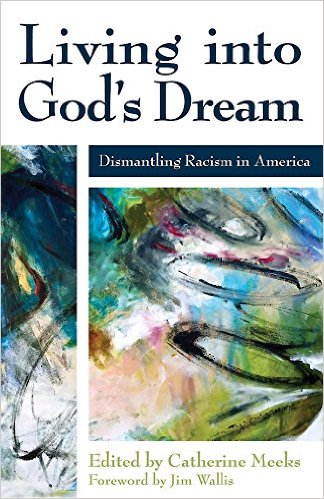 Living into God’s Dream: Dismantling Racism in America edited by Catherine Meeks (Morehouse Publishing) $18.00 I was thrilled to see this book, published by the Episcopalian publishing house, put together by this strong black woman who I was first introduced to, I believe, by John Perkins. Meeks now serves the Diocese of Atlanta as the chair of their Commission for Dismantling Racism, called “The Beloved Community.” Before that, she was a Distinguished Professor of Socio-Cultural Studies at Wesleyan College. She wrote a previous book we’ve stocked called Standing on Their Shoulders: A Celebration of African American Women.
Living into God’s Dream: Dismantling Racism in America edited by Catherine Meeks (Morehouse Publishing) $18.00 I was thrilled to see this book, published by the Episcopalian publishing house, put together by this strong black woman who I was first introduced to, I believe, by John Perkins. Meeks now serves the Diocese of Atlanta as the chair of their Commission for Dismantling Racism, called “The Beloved Community.” Before that, she was a Distinguished Professor of Socio-Cultural Studies at Wesleyan College. She wrote a previous book we’ve stocked called Standing on Their Shoulders: A Celebration of African American Women.
There are nine chapters in this handbook, some written or co-written by Ms Meeks, others by names I mostly don’t know. That’s a good thing for a book like this as it isn’t a star-studded anthology by famous authors, but a gritty story collection of folks in the trenches, so to speak, on the front lines of the struggle for racial justice. (Don Mosely, you may know, was decades ago involved with Koinonia Farms in Americus Georgia; he has a chapter called “Diary of a Spoiled White Guy.” Diana D’Souza has a piece called “A White Lens on Dismantling Racism” and Lynn Huber has an important chapter called “Architects of Safe Space for Beloved Community.” There are a number of other women and men who write – including a fabulously interesting piece on “The American South as Our Holy Land” and a chapter documenting the actual efforts they are taking and the progress they are making in Atlanta.
There is a good study guide in the back for processing these poignant chapters and pressing deeper into this conversation. The Rt. Rev. Jeffrey Lee, Bishop of Chicago, says of it that “the authors are animated by a fierce and tender love for humankind wounded by the sin of racism and a profound conviction that God offers a way through these wounds to new life together. This book is a companion for that journey.”
Richard Hughes, author of Myths America Lives By, says of it:
Living into God’s Dream is a gift to the church, to be sure, but it is also a gift to the American people. With insights that penetrate and probe the biases that lurk in the most unexamined chambers of our hearts, these essays will help even the most reluctant readers to grapple with the truth about white privilege, white supremacy, and what it means to be Black in America. Better still, these essays provide us with the tools we need-including the motivation-to take up the hard work of dismantling racism in our time.
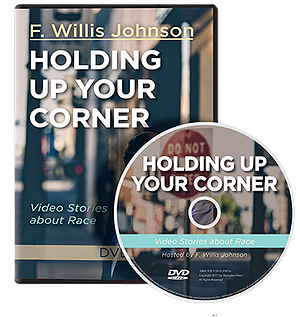
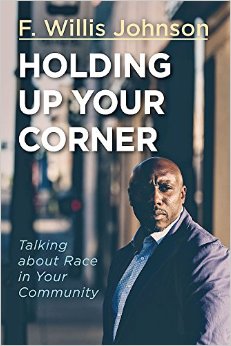 Holding Up Your Corner: Talking About Race In Your Community F. Willis Johnson (Abingdon Press) $15.99 This book came out in the middle of the holiday selling season a few weeks ago and I just didn’t have time to study it. Now, after a few weeks of flipping around through it, I’ve concluded I really do need to work with this. And some of you do, too. It is for Christian leaders (pastor’s mostly, I gather) inviting and equipping them to “respond with confidence when crises occur, lower their own inhibitions about addressing the topic of race, and reclaim their authority as prophetic witnesses and leaders in order to transform their communities.” This book promises practical and foundational sorts of guidance, empowering leaders to:
Holding Up Your Corner: Talking About Race In Your Community F. Willis Johnson (Abingdon Press) $15.99 This book came out in the middle of the holiday selling season a few weeks ago and I just didn’t have time to study it. Now, after a few weeks of flipping around through it, I’ve concluded I really do need to work with this. And some of you do, too. It is for Christian leaders (pastor’s mostly, I gather) inviting and equipping them to “respond with confidence when crises occur, lower their own inhibitions about addressing the topic of race, and reclaim their authority as prophetic witnesses and leaders in order to transform their communities.” This book promises practical and foundational sorts of guidance, empowering leaders to:
…live into their own calling to acknowledge what is not right in their own communities, to understand and affirm the genuine points of pain, in their specific settings, to take faithful action addressing injustice, and to lead others to do the same.
Don’t you feel like you need some help doing this? Christian leader, pundit, writer, pastor, campus minister, youth worker, small group leader, it seems to me that many of us have a calling to acknowledge injustices and facilitate conversations about these hard matters. In an age when everybody is so touchy about all this – some think we should talk more, some people think we should talk less – we need all the help we can get.
This book is fast-paced, has tons of ideas, and is a helpful, practical handbook. Apparently F. Willis Johnson has quite the gift of communication and is beloved in his United Methodist circles. (He is, not insignificantly, the senior minister of Wellspring Church in Ferguson, Missouri, a predominantly African America, inter-generational, UM church plant.) There is no doubt that some of his insight learned about talking together about racism and injustice has been hard won throughout his whole life as a black leader, but also as a pastor in Ferguson these last years.
If this appeals to you and you want to order it — and, if you trust Will Willimon, you should, as he says “I guarantee that after reading this book you will want to work from your corner to become part of God’s work in the world” — you should know that the next step after being motivated and guided by this 112 page book is to get the DVD curriculum by the same name, Holding Up Your Corner: Video Stories About Race (Abingdon; $39.99) If you order it, you should get the Holding Up Your Corner Participants Guide: Guided Conversations ($9.99.) Also, you can get a free downloadable facilitator’s guide that has more resources for viewing the DVD, using the guided conversations participants guide, and processing it with your group. It wouldn’t hurt to have this on hand because, sadly, you are going to be faced with a window of opportunity, probably sooner than later, to talk about this stuff again. Order it today.
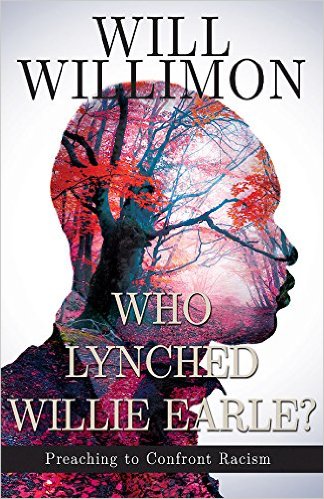 Who Lynched Willie Earle: Preaching to Confront Racism Will Willimon (Abingdon) $17.99 This brand new book came last week and I am thrilled to recommend it. Willimon, you surely know, was Dean of the Chapel at Duke and then a United Methodist Bishop in Alabama. He’s known as an elegant writer and eloquent speaker, even when he’s blunt and insistent on being faithful to the ways of Jesus. (He has pondered about this kind of stuff for years: the classic book written with Stan Hauerwas, Resident Aliens, was re-issued a year or so ago in an anniversary edition and last year he released Fear of the Other, a small but potent book on why we fear “the other” and how to Christianly attend to xenophobias of various sorts.)
Who Lynched Willie Earle: Preaching to Confront Racism Will Willimon (Abingdon) $17.99 This brand new book came last week and I am thrilled to recommend it. Willimon, you surely know, was Dean of the Chapel at Duke and then a United Methodist Bishop in Alabama. He’s known as an elegant writer and eloquent speaker, even when he’s blunt and insistent on being faithful to the ways of Jesus. (He has pondered about this kind of stuff for years: the classic book written with Stan Hauerwas, Resident Aliens, was re-issued a year or so ago in an anniversary edition and last year he released Fear of the Other, a small but potent book on why we fear “the other” and how to Christianly attend to xenophobias of various sorts.)
This new book brings together Willimon’s gritty Christ-focused approach to culture and justice and race with the other major topic for which he is known: homiletics. That is, he is known as a fine preacher and a teacher of preaching. He has numerous volumes on the art of preparing and proclaiming gospel messages, the theology of preaching, and of collections of sermons, his own, and others. He is considered one of the best preachers in America, at least in certain mainline denominational circles.
And so, Who Lynched Willie Earle is, in fact, a book about preaching, from a preacher of the sort they sometimes call a pulpiteer. There are chapters that examine a historic sermon that unfold like a page-turner thriller. He dissects an anti-racist sermon from 1947 in chapters like “Preparing to Preach” and “Assessing the Sermon” which become a homiletical case study and a tremendous chapter of Christian witness. Then there is a hearty, long chapter “Preaching That Confronts Racism.” As he states, obviously true, “Effective 21st -century preaching demands a more perceptive understanding of race and Christian faith.” If the above listed book and DVD Holding Up Your Corner attempts to equip congregational or ministry leader to listen/lead/teach/talk fruitfully about race among the people of the church, facilitating conversations within the faith community, then Willimon’s new one is the necessary other piece: how to preach about the evil of racism. Willimon encouraged preaches to see American racism as an opportunity for Christians to honestly name sin and engage in acts of “detoxification, renovation, and reparation.”
As it says on the back cover of Who Lynched…, “Preaching that confronts racism communicates with power a salvation from the sinful narratives of American white supremacy. It hears black pain, names white complicity, and offers a gospel-centered critique of American exceptionalism and civil religion.” If this book is as strong as it sounds, it may be akin to the raw and honest evangelical truth-telling found in John Piper’s Bloodlines: Race, Cross, and the Christian.
Willimon is a known raconteur, an upbeat teller of tales, and, as one prof put it, “a humorous yet deadly disturber of the peace.” (He even has a novel, spoofing the corporate nature of the modern mega-church.) Many pastors need his encouragement and many preachers need his advice, specifically on this issue of preaching brave sermons about racism. I am sure this book will be used by God to help many get to a place where they can “speak the truth in love” about this stuff.
Here’s part of the book that serves as the very helpful, creative frame: when Willimon, born and bred (“to be a racist” he says) in Greenville, South Carolina, goes off to college, an admired professor, also from the South, asked if he had heard about the lynching perpetrated by folk in his hometown back in 1947. It had gotten some attention in the national press (“A snooty piece was written about it in the New Yorker.”) The prof laments not only the lynching, but that the young Willimon didn’t know anything about it.
This book a half a century later harkens back to that riveting moment of learning about the lynching and becoming aware of the cover up – the first couple pages of his introduction are quintessential Willimon and very much worth reading — and explores not only the reports and documentation about the mob action and murder but of a sermon preached about it which Will says is “the most courageous sermon every preached in Southern Methodism.”
The footnotes here are fascinating, of course, and Willimon shows himself to be quite the helpful scholar, too. He not only does good historical reporting about this important sermon and how it was handled, but he guides us into thinking about the social constructions of race, the facts of racism, and the theological underpinnings of thinking about humans made in God’s image and the radical nature of the unity Christians are to embody in the local church. I think a careful reading of this book will inform and inspire and aid any of us interested in this topic, whether we preach sermons or listen to them. I hope it is widely read and frankly discussed.
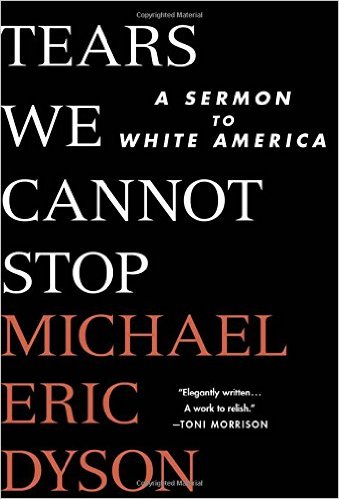 Tears We Cannot Stop: A Sermon To White America Michael Eric Dyson (St. Martin’s Press) $24.99 Well, if conventional, evangelical sermonizing taught by the likes of seminary prof Will Willimon isn’t your literary cup of tea, then perhaps this master of passionate, bold, literary prose who is a sociology prof (at Georgetown) will grab your heart and imagination. Dyson, an old Philly guy, as I recall, is known for writing fun and informative stuff on a wide variety of topics. He’s written about race and power and religion but often gets at that by way of pop culture, sports and music and more. I loved his old book on Tupac (Holler If You Hear Me) and we used to carry his one on Marvin Gaye. Between God and Gangster Rap was a pivotal resource. He’s written bunches of other work – hardly any other black public intellectual has been so prolific – including well received books about Malcolm X and about King and, in 2016, an important work on Obama called The Black Presidency: Barak Obama and the Politics of Race in America. The former President, himself (who read widely as we know) has said, “Anyone who speaks after Michael Eric Dyson pales in comparison.”)
Tears We Cannot Stop: A Sermon To White America Michael Eric Dyson (St. Martin’s Press) $24.99 Well, if conventional, evangelical sermonizing taught by the likes of seminary prof Will Willimon isn’t your literary cup of tea, then perhaps this master of passionate, bold, literary prose who is a sociology prof (at Georgetown) will grab your heart and imagination. Dyson, an old Philly guy, as I recall, is known for writing fun and informative stuff on a wide variety of topics. He’s written about race and power and religion but often gets at that by way of pop culture, sports and music and more. I loved his old book on Tupac (Holler If You Hear Me) and we used to carry his one on Marvin Gaye. Between God and Gangster Rap was a pivotal resource. He’s written bunches of other work – hardly any other black public intellectual has been so prolific – including well received books about Malcolm X and about King and, in 2016, an important work on Obama called The Black Presidency: Barak Obama and the Politics of Race in America. The former President, himself (who read widely as we know) has said, “Anyone who speaks after Michael Eric Dyson pales in comparison.”)
This brand new one is fierce and passionate and raw and personal. Because I do not know all of his many previous works I cannot say for sure, but some are saying it is his most elegant and yet his most fierce. I do not mean to distract at all from Dyson’s own intellectual and literary gifts or contribution, but the excerpt I read reminded me of one of the most discussed books on this topic in recent years, Ta-Nehisi Coates’ Between the World and Me. Not unlike him, some reviewers are making comparisons to the seminal work of James Baldwin. The Fire This Time, maybe? You must read Dyson, who demands we hear his pain, honor his people and their journey, and take up a hopeful vision with words asking “How can we make it through the long night of despair to the bright day of hope?”
The great literary figure Toni Morrison writes that it is:
Elegantly written, Tears We Cannot Stop is powerful in several areas, moving personal recollections; profound cultural analysis; and guidance for moral redemption. A work to relish.
And, speaking of amazingly powerful, award winning authors, read this from Stephen King:
Here’s a sermon that’s as fierce as it is lucid. It shook me up, but in a good way. This is how it works if you re black in America, this is what happens, and this is how it feels. If you’re black, you’ll feel a spark of recognition in every paragraph. If you re white, Dyson tells you what you need to know — what this white man needed to know, at least. This is a major achievement. I read it and said amen.
And you know what? As Dyson is fairly broad in calling this gut-wrenching cry from the heart a “sermon” it is, in fact, written by one who is not only a cultural critic, scholar, and writer. Eric Michael Dyson – the Reverend Eric Michael Dyson — has been an ordained minister for thirty-five years. And he can preach. Perhaps these are hard truths for some of us to hear, but I hope you will try.
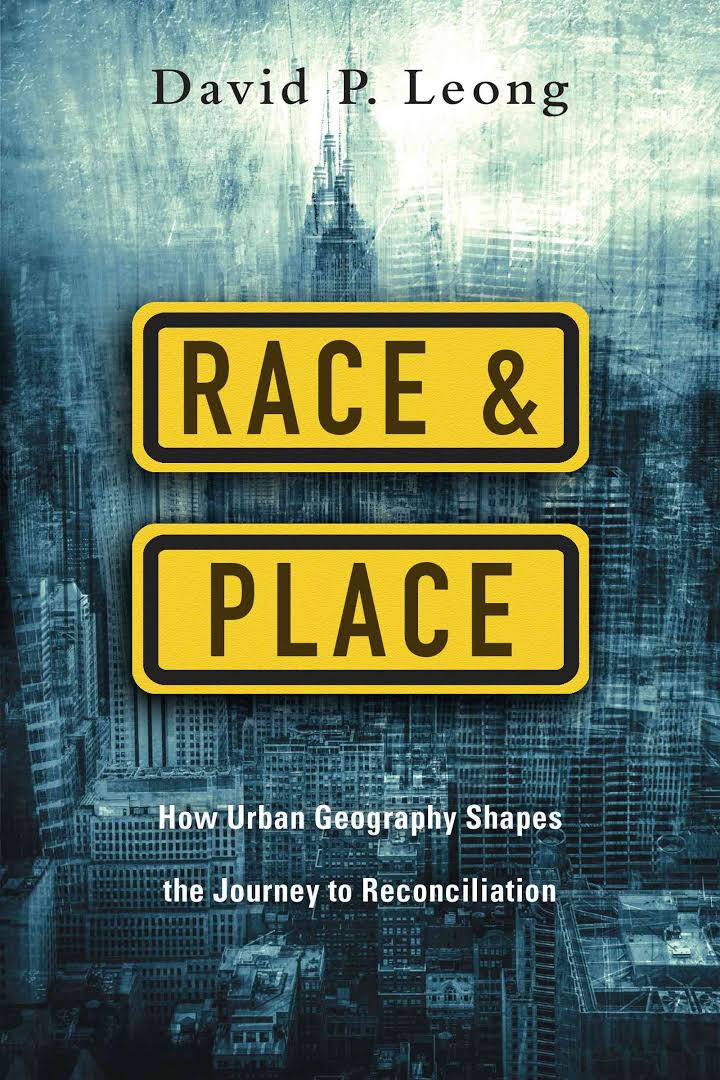 Race and Place: How Urban Geography Shapes the Journey to Reconciliation David P. Leong (IVP) $16.00 IVP can always be counted on to offer some of the most astute, insightful, and useful books on racial justice, multi-ethnic ministry, and authentic visions of reconciliation. They keep offering new ones, with new angles, fresh authors, important aspects of this big call to embody diversity and be effective in evangelical ministry in a culturally a racially diverse culture. So I trust them. A lot.
Race and Place: How Urban Geography Shapes the Journey to Reconciliation David P. Leong (IVP) $16.00 IVP can always be counted on to offer some of the most astute, insightful, and useful books on racial justice, multi-ethnic ministry, and authentic visions of reconciliation. They keep offering new ones, with new angles, fresh authors, important aspects of this big call to embody diversity and be effective in evangelical ministry in a culturally a racially diverse culture. So I trust them. A lot.
And this brilliant new book makes that case nicely, that they are on the cutting edge of doing useful work – not arcane philosophical studies but serious scholarship to be used by those doing real-world ministry. Race and Place reminds us of an important aspect of our work on this topic, namely, that “geography matters.” If we “long for diverse, thriving neighborhoods and churches” we have to deal with “geographic structures and systems that create barriers to reconciliation and prevent the
flourishing of our communities.”
Folks who are doing important work living and writing about missional outreach (like Tim Soerens, author of The New Parish) get how important all this is. Soerens notes,
For way too long, conversations about race haven’t included place, and vice versa. With the insight of a scholar and wisdom that only comes from putting ideas into practice, Dr. Leong offers an invitation to the belonging, solidarity, and hope we so desperately need today.
I am so excited to read this, not only because I think he has much new to teach us, but because I am particularly interested in “a sense of place” and write and preach about ministry contextualized to place – from small towns to rust belt cities to rural places – and about social justice and racial equality. To see these two themes brought together – Wendell Berry and Martin Luther King, if you will – is a great, great joy and I’m sure I will love reading this book. I bet you will too!
(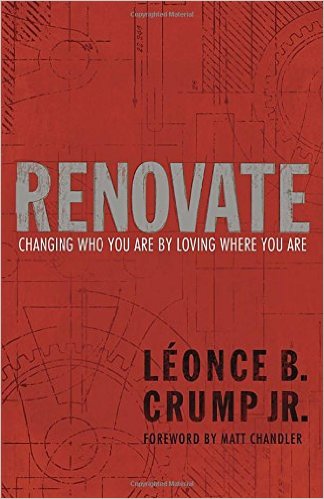 By the way, I have to insert here that there is an African American pastor and writer who cites both King and Wendell Berry named Leonce Crump, whose book Renovate: Changing Who You Are By Loving Where You Are [Multnomah Press; $14.95] is spectacularly interesting and immensely helpful. I reviewed it less than a year ago at BookNotes and am thrilled to share that he is speaking from the main stage at Jubilee 2017 out in Pittsburgh this February. Yay.)
By the way, I have to insert here that there is an African American pastor and writer who cites both King and Wendell Berry named Leonce Crump, whose book Renovate: Changing Who You Are By Loving Where You Are [Multnomah Press; $14.95] is spectacularly interesting and immensely helpful. I reviewed it less than a year ago at BookNotes and am thrilled to share that he is speaking from the main stage at Jubilee 2017 out in Pittsburgh this February. Yay.)
David Leong had previously written a short but even more academic study of place and urban geography/culture a few years back, a book we stock called Street Signs: Towards a Missional Theology of Urban Cultural Engagement (Wipf & Stock; $32.00.) This new one, though, Race and Place, about our racialized cities – and how we are impacted now by decisions made generations ago about streets and school districts and neighborhoods and shopping centers and more – is going to be so helpful for anyone wanting to embody a sense of care for the places God has sent us. Unpacking the systemic challenges of patterns of race relations – what some might call the social architecture or what others might suggest are “principalities and powers” is vital. Race and Place: How Urban Geography Shapes the Journey to Reconciliation is going to be a very valuable contribution to our ongoing work as Kingdom people. Order it today.
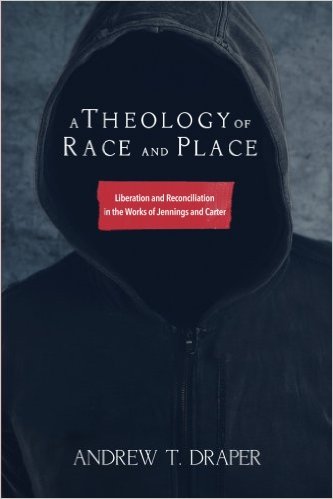 A Theology of Race and Place: Liberation and Reconciliation in the Work of Jennings and Carter Andrew T. Draper (Pickwick Publications) $40.00 I suppose I don’t have to say it, but this is a scholarly work, emerging from Andrew’s doctoral dissertation. Draper is a Visiting Professor of Theology at Taylor University (where he also directs the Honor’s Guild.) He is the founding senior pastor of Urban Light Community Church in Muncie Indiana, a Church of God congregation.
A Theology of Race and Place: Liberation and Reconciliation in the Work of Jennings and Carter Andrew T. Draper (Pickwick Publications) $40.00 I suppose I don’t have to say it, but this is a scholarly work, emerging from Andrew’s doctoral dissertation. Draper is a Visiting Professor of Theology at Taylor University (where he also directs the Honor’s Guild.) He is the founding senior pastor of Urban Light Community Church in Muncie Indiana, a Church of God congregation.
Draper thanks Brian Brock for guiding him in some of his scholarly passions, pursued, finally, at the University of Aberdeen, the milieu of the Scottish Divines. What a curious story this is, bringing together a wide variety of theological and spiritual and scholarly influences. I love this sort of interdisciplinary work, very serious academic effort, offered for the sake of the world.
You need to know this, at least: the two names in the subtitle are both very serious young scholars, both with some connections to Duke Divinity School. William James Jennings, now at Yale Divinity School, wrote the significant, sophisticated 2011 volume, The Christian Imagination: Theology and the Origins of Race (Yale University Press; $27.50.) J. Kameron Carter wrote in 2008 a very important, heady volume, Race: A Theological Account, which remains in hardcover from Oxford University Press ($38.95.)
I wish the publishers would have included the first names, at least, of the scholars under consideration in the subtitle to alert potential readers that it is, in fact, a close reading and study of these two important theologians of race and religious studies. That Stanley Hauerwas has a very favorable and detailed blurb on the back shouldn’t surprise us. It is serious stuff.
But listen to this from urban activist, evangelical pastor, and co-author of several books with John Perkins, Wayne “Coach” Gordon, of Lawndale Community Church, in an under-resourced part of Chicago:
The theology of race and place is sorely neglected in the American church. Andrew Draper is extremely qualified to speak on both as a pastoral practitioner of the philosophy of ministry embodied in Christian community development. This includes two powerful aspects, reconciliation and relocation, both of which demonstrate that place matters. I highly recommend A Theology of Race and Place.
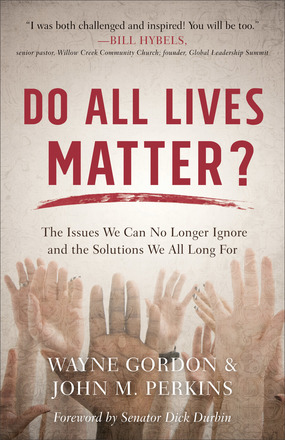 PRE-ORDER: Do All Lives Matter?: The Issues We Can No Longer Ignore and the Solutions We All Long For Wayne Gordon & John M. Perkins (Baker Books) $12.99 This title not yet released – due February 14, 201. Who hasn’t wanted to agree with the slogan and hashtag Black Lives Matter. After the long list of often unarmed black men shot, sometimes even in the back, by police, our hearts go out, our voices rise, insisting that this can’t be right. Made in God’s image, Black lives matter! And who among us wouldn’t say that Blue lives matter; of course. Police, as such, are not all at fault, and we want to affirm their bravery and service; especially after the sniper shooting of police in Dallas last summer. Of course.
PRE-ORDER: Do All Lives Matter?: The Issues We Can No Longer Ignore and the Solutions We All Long For Wayne Gordon & John M. Perkins (Baker Books) $12.99 This title not yet released – due February 14, 201. Who hasn’t wanted to agree with the slogan and hashtag Black Lives Matter. After the long list of often unarmed black men shot, sometimes even in the back, by police, our hearts go out, our voices rise, insisting that this can’t be right. Made in God’s image, Black lives matter! And who among us wouldn’t say that Blue lives matter; of course. Police, as such, are not all at fault, and we want to affirm their bravery and service; especially after the sniper shooting of police in Dallas last summer. Of course.
But then a slogan became “all lives matter.” And a deeper debate developed — if one goes into an emergency room with a broken leg, with the bone protruding out of an awful gash, it would be nearly pointless (and maybe counterproductive) to say that all bones matter. Well, gee, obviously, but at that point the urgent demand was to pay attention and affirm that leg bones matter! I am sure I don’t have to explain that many who care about the effectiveness of the #blacklivesmatters campaign felt it was undermined and its power deflected by other lives matter saying.
This brave book, coming out in mid-February, by an active white urban pastor — nicknamed “coach” because of his powerful mentoring role on the streets and the truthful, evangelical civil rights leader, Dr. John Perkins, get their heads together to hammer out some urgent thoughts about what we should and shouldn’t say about all of this. The discussion will be vivid and honest, the conversation lively, the insight passed on priceless. There will be an afterward reflecting on the conversation by old civil rights activist and scholar of civility, Dr. Richard Mouw.
You can decide if you think you can use this — for your own learning and growth or to pass out to that special friend who may need to read it — but I am hoping that many, many BookNotes readers order it from us. PRE ORDER it at the link below. Just tell us how many you want. Easy.
BookNotes
DISCOUNT
ANY ITEM MENTIONED
10% off
order here
takes you to the secure Hearts & Minds order form page
just tell us what you want
inquire here
if you have questions or need more information
just ask us what you want to know
Hearts & Minds 234 East Main Street Dallastown, PA 17313 717-246-3333
